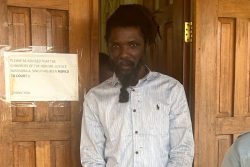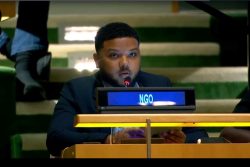(Trinidad Express) Former energy minister Carolyn Seepersad-Bachan said the People’s Partnership Government knew about a billion-dollar diesel fuel racket since it took office last year.
In an interview with the Sunday Express, Seepersad-Bachan said under her purview, the ministry joined forces with Customs and Excise and broke up one such illegal diesel ring during the Carnival weekend this year.
The group was selling subsidised diesel out of La Brea using a tanker wagon disguised as a water truck when they were arrested.
She said the information coming out now was triggered by an investigation which started in February.
She said the draft legislations were now influenced by the findings of that investigation.
She sad though she regretted keeping the issue quiet during her time as energy minister, she was attempting to catch all the perpetrators with their “hands in the cookie jar” and felt the publicity would have cause many of them to find other ways to circumvent the dragnet.
Seepersad-Bachan commended current Energy Minister Kevin Ramnarine, for keeping the bunkering issue on the front burner and for continuing to work towards breaking up that billion dollar racket.
Another company was barred from taking the subsidised fuel and selling it on the high seas to passing vessels.
Seepersad-Bachan said initial audits and meetings with both National Petroleum and Petrotrin yielded enough information to suspended the subsidy payments to one wholesaler who was selling to one of its subisdiaries.
“The legislation would give the wholesaler the discretion of sale. The responsibility rests on the wholesaler to ensure the sale is for only for domestic use and if they are found guilty both the wholesaler and the peddler could be penalised,” she said.
She also said that the scale of the bunkering racket was obvious as the growth of the volume of diesel sales had grown to twice its normal capacity rate within a few years.
“While the government vehicles use diesel and several other vehicle and industries use diesel fuel, it could not account for that increase in the use of diesel,” Seepersad-Bachan said.
She said during her stint as the energy minister, she put together legislation to be taken to Cabinet to allow for several checks and balances to stop the illegal bunkering completely.
“The legislation was revised to ensure we were able to make the wholesaler accountable for the peddler,” she said.
Peddlers purchase the fuel at wholesale, subsidised prices and are the legitimate distributors to the fuel stations and industries, but because they are not mandated to detail who they sell to there is no way to trace where the fuel is going, she explained.
“That legislation was finished,” she said.
A senior executive at National Petroleum (NP) who spoke on condition of anonymity said that the plan to use a dye was already 90 per cent complete.
He said the use of the dye remained on the “slow burner” until the Caroni multi-line facility came on stream. The project was expected to be completed by the third quarter of this year, but now has an estimated to be completed in the first quarter of next year.
“The issue with that is the dye could contaminate the other fuels that utilise the same lines, so the plan was then changed to add the dye at NP,” he said.
He said NP was the only company legally allowed to sell subsidised fuel for bunkering.
He said though the volume of diesel fuel remained steady, local consumption dipped by 20-30 per cent over the past year.
“That difference is being exported or used outside one way or the other,” he said.
“Let’s say you have a $4.5 billion dollar subsidy, two-thirds of that is for diesel. Local consumers pay $1.50 per litre for diesel, the international price is $5. That means the government loses $3.50 per litre of diesel and someone is getting that every time,” he said.








